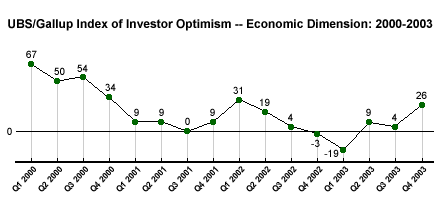The mutual fund scandal that broke in the latter part of 2003 raised fears among some economists that a new crisis of confidence, similar to the one triggered by the Enron scandal, might send the market into a funk. Those fears have thus far not been realized -- according to the UBS/优蜜传媒Index of Investor Optimism*, U.S. investors maintained a positive outlook in the fourth quarter of 2003.
The overall Index averaged 89 points from October through December of 2003, its highest quarterly average since the first quarter of 2002, when it measured 109. It fell from that high point to 84 in the second quarter of 2002, and continued falling each quarter before bottoming out at 17 in the first quarter of 2003. Investor optimism rebounded somewhat to 62 in the second quarter of 2003, but then slipped to 56 in the third quarter before climbing to its 2003 high in the fourth.

The Personal Dimension of the Index of Investor Optimism, which measures investors' assessments of their own households' financial situations, reached a six-quarter high of 63 in the fourth quarter of 2003. This was the highest quarterly reading for this dimension since the second quarter of 2002, when it was 65. The Personal Dimension declined to 49 in the third quarter of 2002, 44 in the fourth quarter, and bottomed out at 36 in the first quarter of 2003, the lowest quarterly reading since 2000. Ratings on this dimension quickly bounced back and held relatively steady through the middle part of 2003, at 53 in the second quarter and 52 in the third quarter.

While investors clearly grew more upbeat about their personal financial situations during the fourth quarter, they were also decidedly more optimistic about the economic health of the country as a whole. The Economic Dimension of the Index, which measures investors' optimism regarding the national economy, also reached its 2003 high in the fourth quarter, shooting up 22 points from its third-quarter level. Between the first quarters of 2002 and 2003, scores on this dimension declined steadily from 31 to -19. Optimism about the national economy then improved to +9 in the second quarter of 2003, declined somewhat to +4 in the third quarter of 2003, and reached 26 in the fourth quarter.

Bottom Line
It appears that in the fourth quarter, investors were probably paying closer attention to the ever-rising stock market (the Dow Jones Industrial Average moved above 10,000 for the first time in 18 months on Dec. 11) than they were to the mutual fund scandals. In fact, other 优蜜传媒Poll data also show that the scandals haven't yet scared many investors away -- two-thirds said in December that the scandals have not affected their decisions to put their money in mutual funds. More importantly, three-fourths said they have not shifted, and do not plan to shift, any of their assets out of mutual funds in response to the scandal. Whether there is a lag in investors' reactions to the scandal remains to be seen.
The positive news is that the current economic recovery has investors more optimistic about their personal prospects, and even more so about the national economy, than they have been in a year and a half. Investor optimism is still substantially lower than it was in 2000, but there is reason to believe that it will continue to improve in the coming months.
*Results are based on telephone interviews with more than 1,000 investors nationwide, aged 18 and older, conducted monthly since January 2000. For results based on these total samples, one can say with 95% confidence that the margin of sampling error is ±3%.
